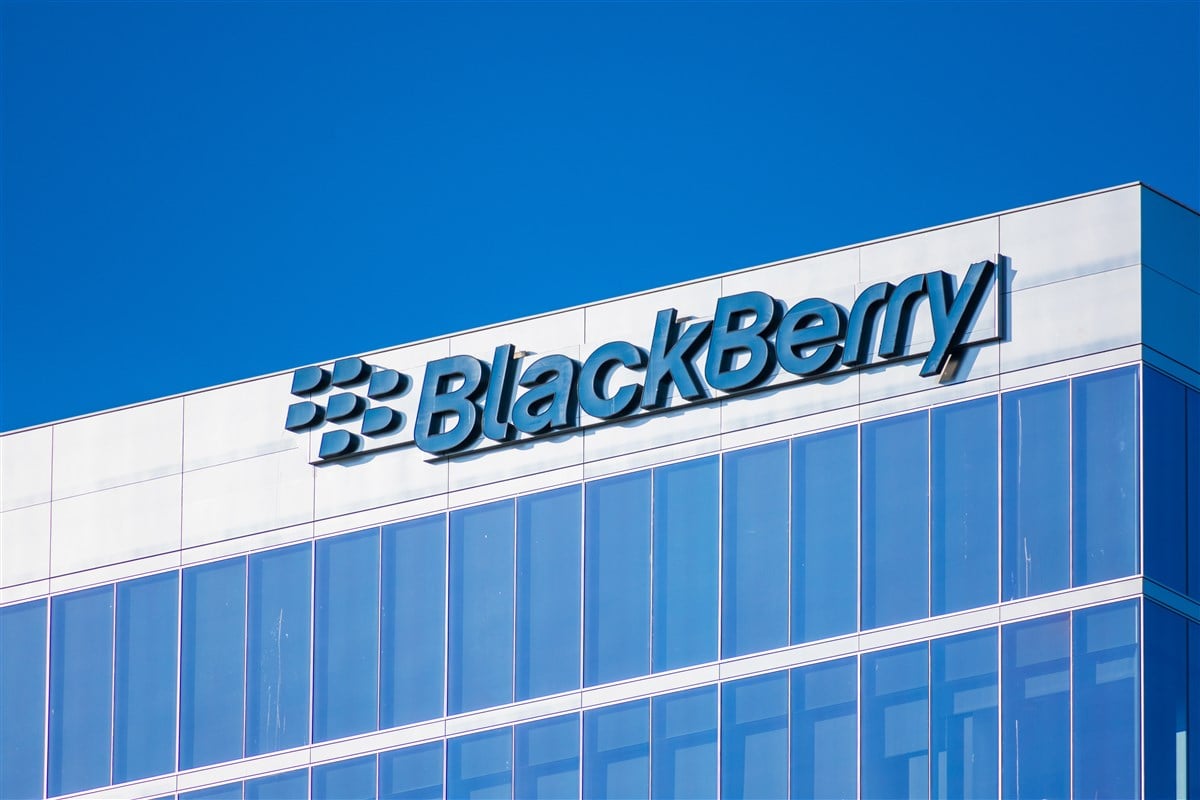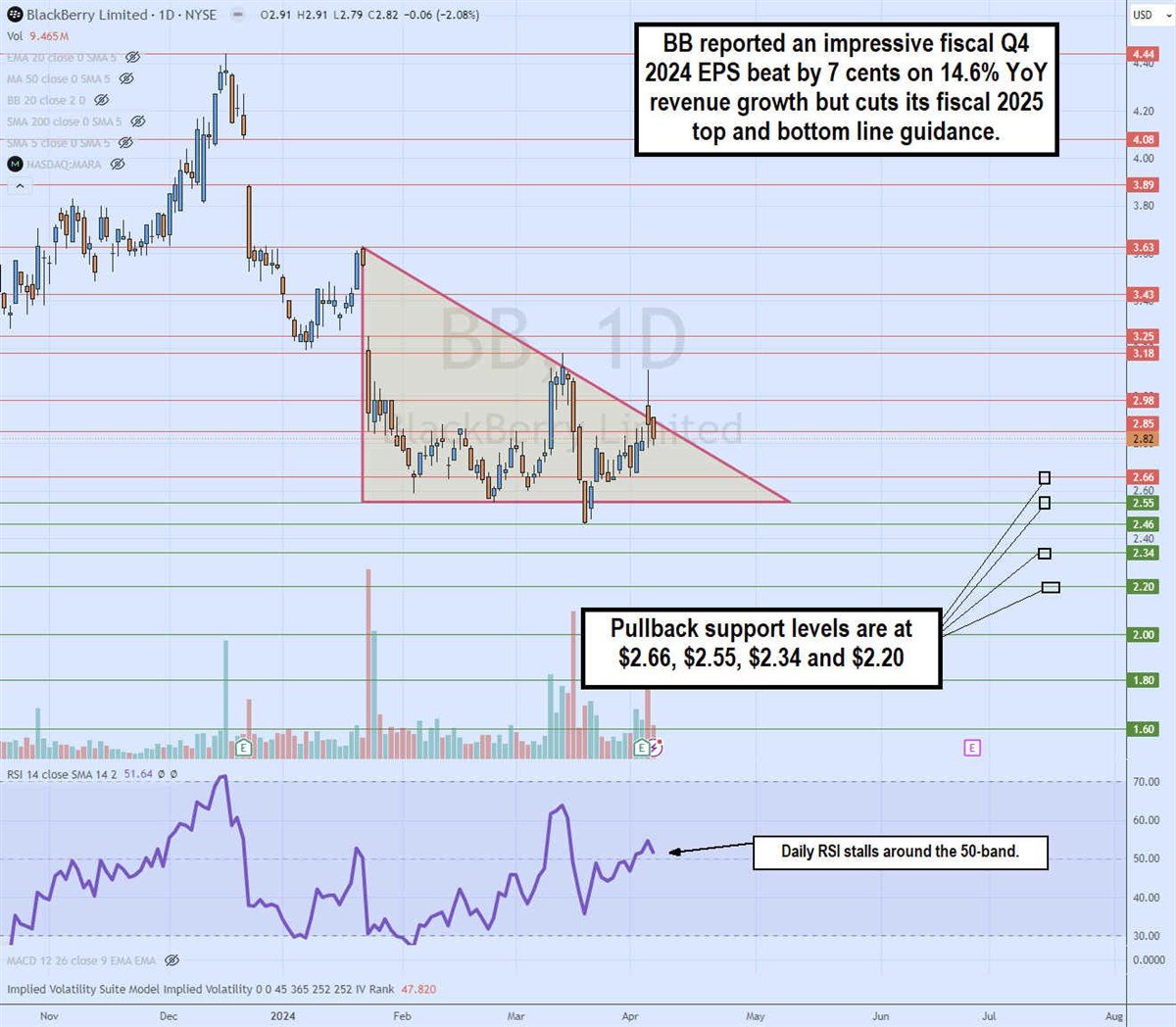
BlackBerry Ltd (NYSE: BB) was once the leader in the smartphone segment in the mid-2000s when they were known as Research In Motion. Their BlackBerry smartphones had built-in physical keyboards and a trackball utilizing SMS technology. Its users could be identified by clicking away at the tiny keyboards and small screens throughout the day. They ushered in the early days of the smartphone era.
The Smartphone Revolution Passes By BlackBerry
The advent of Apple Inc. (NASDAQ: AAPL) iPhones and Samsung Electronics Co. Ltd (OTCMKTS: SSNLF) Galaxy smartphones eventually took over the market with on-screen keyboards, larger screens and lighter sleek designs with infinite applications. Research in Motion changed its name and identity to BlackBerry, ditched its clunky smartphones and transitioned into a software company focused on enterprise cybersecurity, software licensing and Internet-of-Things (IoT) in the computer and technology sector. Needless to say, the competition has been stiff, especially against giants such as Palo Alto Networks Inc. (NASDAQ: PANW) and Fortinet Inc. (NASDAQ: FTNT).
Transitioning from Hardware to Software
While BlackBerry continued to lose market share among consumers, its QNX operating system was still very respected for its exceptional security features, including encrypted messaging, threat detection and secure emails. It's one of the main reasons the United States Department of Defense (DoD) standardized BlackBerry devices over iPhones as a protocol for its employees. BlackBerry devices were the preferred devices among government agencies to protect sensitive information from espionage and cyber threats.
This helped transition the company to ditch the hardware and embrace the software model to further claw out a niche in the mobile cybersecurity segment. They hold numerous patents in mobile security and communication protocols. In fact, Research in Motion was notorious for never-ending litigation defending its patents, often perceived as the original "patent troll."
From Patent Troll to MDM and UEM Solutions Provider
BlackBerry ditched the hardware in 2016 and sought to establish itself in the mobile device management (MDM) and unified endpoint management (UEM) segment. The company even found itself licensing its data analysis and embedded systems to the vehicle industry. The company has developed its artificial intelligence (AI) powered Cylance cybersecurity solution, which it claims has prevented 133% more attacks, performing 13X faster while utilizing 20X less system overhead than the competition. Its IoT business has also emerged as a promising growth engine. The company has been struggling to return to its glory days as it has failed to achieve consistency with its results. Check out the sector heatmap on MarketBeat.

Daily Descending Triangle Pattern
The daily candlestick chart on BB illustrates a descending triangle pattern. The descending (falling) trendline formed at $3.63 on January 23, 2024, capping bounces at lower highs towards the flat-bottom lower trendline at $2.55. The daily relative strength index (RSI) has stalled around the 50-band. The triangle failed a breakdown attempt on March 19, 2024, as shares slingshot higher off the $2.46 swing low to reject the breakout attempt on April 4, 2024, as shares fell back under the descending trendline. Pullback supports are at $2.66, $2.55, $2.34 and $2.20.
BlackBerry analyst ratings and price targets are at MarketBeat. BlackBerry's peers and competitor stocks can be found with the MarketBeat stock screener.
Improving Fundamentals
BlackBerry reported fiscal Q4 2024 EPS of 3 cents, beating analyst expectations for a loss of 4 cents by 7 cents. Revenues grew 14.6% to $173 million, beating $150.47 million consensus estimates. Its IoT division's QNX royalty backlog rose to $815 million.
Financial Metrics for the Quarter
The shining highlight was the all-time quarterly record of $66 million achieved in IoT revenue, which jumped 25% YoY. IoT gross margins were 85%. Cybersecurity revenues rose 5% YoY to $92 million, with a gross margin of 65%. Cybersecurity ARR rose sequentially by 3% to $280 million. Licensing revenues were $15 million.
Momentum Cut Short by Lowered Guidance
While BlackBerry's fiscal Q4 2024 report was inspiring, its momentum was again cut short with downside guidance. The company expects a fiscal Q1 2025 EPS loss of 6 cents to 4 cents versus consensus estimates for a loss of 3 cents. Revenue expectations also fell short, with expectations between $130 million and $138 million versus $149.08 million consensus estimates. Full-year 2025 revenues are expected to be between $588 million and $612 million, falling short of the consensus estimates of $627.42 million.
Two Steps Forward, One Step Back
BlackBerry appointed its Cybersecurity division president, John Giamatteo, as its new CEO on December 15, 2023. Giamatteo was formerly president and Chief Revenue Officer of cybersecurity giant McAfee and COO at AVG Technologies. The new CEO sparked some positive sentiment, but plans for a spin-off of its IoT division caused shares to topple. On April 3, 2024, a former senior BlackBerry executive filed a lawsuit against Giamatteo and BlackBerry, alleging sexual harassment along with instances with other women. The company denies the claims, stating, "BlackBerry and Mr. Giamatteo believe that these allegations are without merit and intend to defend against them vigorously."














